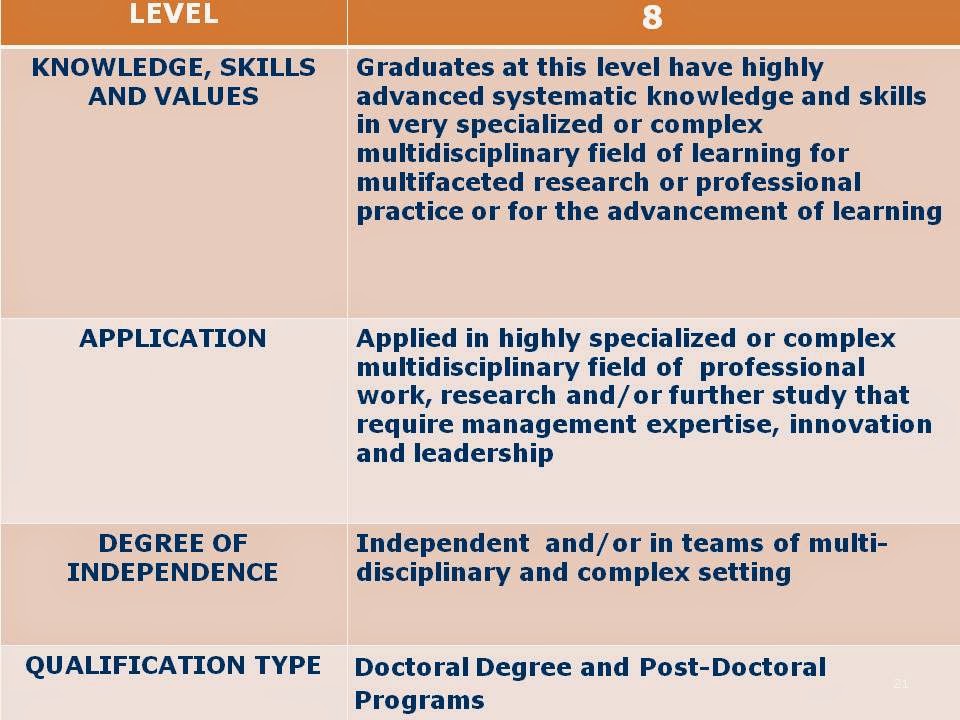What is a Qualification?
It is a package of competencies describing a particular function or job role existing in an economic sector. It covers the work activities required to undertake a particular job role.
What is PQF?
- It is a national policy describing the levels of educational qualifications and sets the standards for qualification outcomes.
- A quality assured national system for the development, recognition and award of qualifications based on standards of knowledge, skills and values acquired in different ways and methods by learners and workers of a certain country
- It is competency-based and labor market driven.
- It is assessment- based qualification recognition.
Objectives of the PQF:
- To establish national standards and levels for outcomes of education and training, skills and competencies;
- To support the development and maintenance of pathways and equivalencies which provide access to qualifications and assist people to move easily and readily between the different E & T sectors and between these sectors and the labour market;
- To align the PQF with international qualifications framework to support the national and international mobility of workers thru increased recognition of the value and comparability of Philippine qualifications.
Benefits of the PQF:
FOR THE PERSON
- Encourages lifelong learning allowing the person to start at the level that suits him and then build-up his qualifications as his needs and interests develop and change over time.
- Certificates and licenses recognized by government.
FOR THE EMPLOYERS
- Assures that standards and qualifications are consistent to job requirements/demand.
- Provides common understanding on standards, qualifications and levels.
FOR THE EDUCATION & TRAINING PROVIDERS
- Ensures transparency in training provision, conformance to standards and preciseness of accountability for learning outcomes
- Provides common understanding of policies and guidelines on credit transfers, articulation, portability, bridges pathways and RPL
FOR THE AUTHORITIES
- Provides the standards, taxonomy and typology of qualifications as bases for granting approvals to providers and stakeholders
- Harmonizes qualifications in E & T across Philippines
The development of the Philippine Qualifications Framework has to be done in consideration of a number of inputs in order to generate the desired outputs. The inputs considered are the industry needs, the need for global recognition of competencies, current qualification issues.
It shall utilized extensive consultations and advocacy with stakeholders towards the successful implementation of the PQF in the country.
Three key agencies are involved in the policy making, administration and management of formal education: The Department of Education (DepEd) for basic education; the Technical Education and Skills Development Authority (TESDA) for technical-vocational education and training and the Commission on Higher Education (CHED) for tertiary and higher education.
With the implementation of the K to 12 program, basic education is composed of six (6) grades in addition to the mandatory Kindergarten program in the elementary. The secondary level is composed of four (4) years Junior high school and two (2) years Senior high school. The third level is the tertiary education consisting of higher education and post secondary schooling. Higher Education is divided into baccalaureate, masters and doctorate levels in various programs or disciplines.
Though compartmentalization exists in the Philippine education system, quality is assured through a standards and accreditation system for basic and higher education institutions and through a unified registration and accreditation system for technical-vocational institutions.
Below is a simplified presentation of the PQF as a result of the consultations with stakeholders. This was presented and approved by the SDC Cabinet Level last May 18, 2012. It outlines the 8-level qualifications covered by the PQF starting from NC I up to Doctoral and Post Doctoral programs.
Level 1
Level 2
Level 4:
Level 5
Level 6: Graduate of a Bachelors degree course
Level 7: Graduate of a Masters Degree course
Level 8: Graduate of a Doctoral and Post-Doctoral degree course







 12:49 AM
12:49 AM
 RSG
RSG










 Posted in:
Posted in: 









0 comments:
Post a Comment